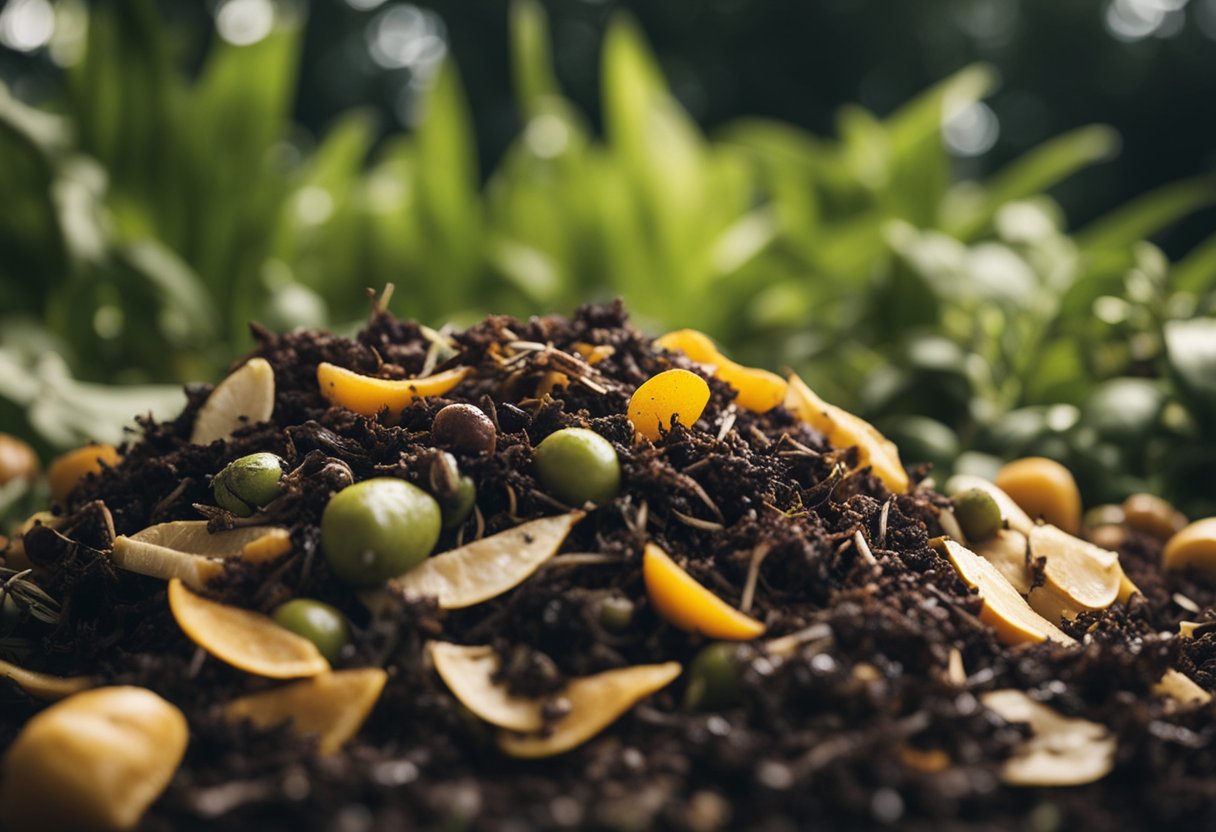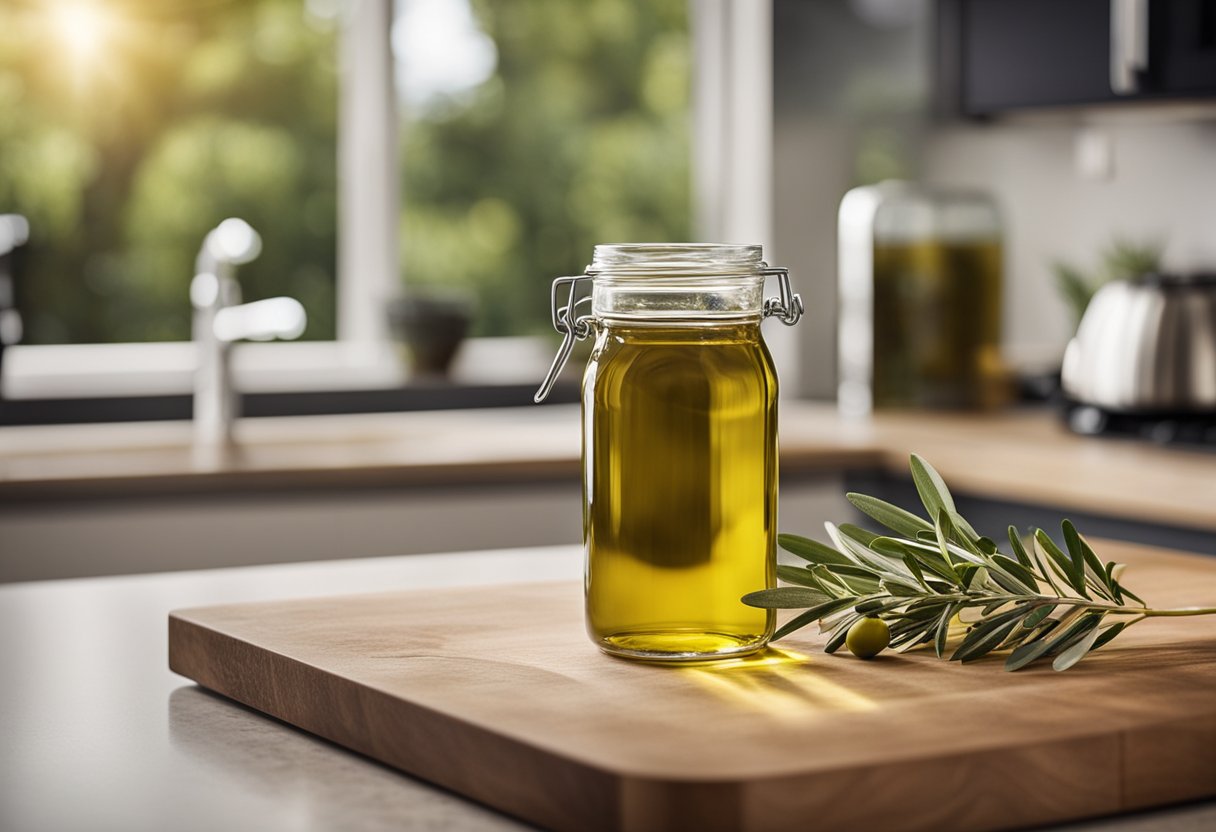As an Amazon Associate I earn from qualifying purchases.
At A Glance
It’s not recommended to compost olive oil as it can create issues within your compost pile. Olive oil, like other oils and fats, can coat materials and prevent the necessary air and moisture from reaching other compostable materials, thus inhibiting the aerobic decomposition process. Additionally, oils can attract pests and create unpleasant odors as they turn rancid. They can also create a greasy layer in the compost pile, making it difficult to manage. While small amounts of olive oil from food scraps might not cause significant problems, it’s best to avoid adding larger quantities of oils to your compost pile to maintain a healthy and efficient composting process.
Composting is a great way to reduce waste and create nutrient-rich soil for your plants. However, not all materials can be composted, and it can be confusing to know what can and cannot be added to your compost bin. One common question is whether olive oil can be composted.

I did some research and found that olive oil can be composted, but there are some guidelines to follow. It is important to only add small amounts of vegetable-based oils, such as olive oil, to your compost. Adding too much oil can slow down the composting process and create an unpleasant odor. Additionally, it is important to avoid adding oils that have come into contact with meat or dairy products, as these can attract pests and create an imbalance in your compost.
There are a few different ways to compost olive oil. One method is to let the oil solidify or freeze it before adding it to your compost bin. Another option is to mix the oil with other compostable materials, such as leaves or grass clippings, to help balance the carbon-to-nitrogen ratio in your compost. If you are unsure about whether or not to add olive oil to your compost, it is always best to err on the side of caution and dispose of it in another way.
Can You Compost Olive Oil?
As someone who is passionate about composting, I often get asked whether it’s possible to compost olive oil. The short answer is yes, you can compost olive oil, but it’s important to do it correctly to avoid any issues.
One thing to keep in mind is that adding too much oil to your compost can slow down the composting process. So, if you’re going to compost olive oil, it’s important to only add small amounts. Additionally, it’s best to use plant-based oils that haven’t come in contact with meat. This means that olive oil, sunflower oil, rapeseed oil, corn oil, and coconut oil are all good options.
To compost olive oil, you can mix it with other organic materials like food scraps, yard waste, and shredded paper. However, it’s important to avoid adding any dairy products, meat, bones, or diseased plants to your compost. These items can attract pests and slow down the composting process.
Another option is to freeze your olive oil before adding it to your compost. This will help solidify the oil and make it easier to mix with other organic materials.
Overall, composting olive oil is a great way to reduce waste and create nutrient-rich soil for your plants. Just be sure to add it in small amounts and avoid adding any non-organic materials to your compost.
Understanding the Composting Process
Composting is the process of breaking down organic materials into a nutrient-rich soil amendment. The process of decomposition is facilitated by microorganisms such as bacteria and fungi that break down organic matter into simpler compounds. This process can occur naturally, but it can also be accelerated by creating a compost heap.
There are different types of composting methods, but aerobic composting is the most common. This method involves providing a sufficient amount of oxygen to the microorganisms that break down the organic matter. Hot composting is a type of aerobic composting that involves maintaining a high temperature in the compost heap. This method can kill pathogens and weed seeds that may be present in the organic matter.
When composting vegetable oil, it is important to note that only small amounts should be added to the compost heap. Vegetable oil is high in fat, which can slow down the composting process. Composting vegetable oil in moderation can help prevent the creation of greasy spots or acidic pockets in the compost heap.
In hot composting, the temperature of the compost heap can reach at least 140°F, which can help break down the vegetable oil more quickly. However, if the temperature does not increase, anaerobic conditions can occur, which can lead to rotting instead of composting.
In summary, composting is a natural process that involves the breakdown of organic matter by microorganisms. Aerobic composting is the most common method, and hot composting can help accelerate the process. When composting vegetable oil, moderation is key to prevent the creation of greasy spots or acidic pockets in the compost heap.
Effects of Olive Oil on Compost

Composting is a great way to recycle organic waste and create nutrient-rich soil. However, adding the wrong materials to your compost pile can have negative effects. When it comes to olive oil, it is important to be cautious.
Olive oil is a greasy substance that can cause issues in your compost. Adding too much olive oil to your compost pile can reduce airflow, leading to foul odors. Additionally, the greasy nature of olive oil can attract critters to your compost pile.
While olive oil can be composted, it should be done in small amounts. Adding too much olive oil can have negative effects on the composting process. Instead, consider using small amounts of olive oil in your cooking and disposing of the excess in the trash.
Overall, while olive oil is a healthy cooking oil, it is not the best option for composting. If you do choose to compost olive oil, be sure to do so in small amounts and monitor your compost pile for any negative effects.
How to Dispose Olive Oil Properly

When it comes to disposing of olive oil, it’s important to do so in a way that is safe for both the environment and your household. Pouring used olive oil down the drain can cause clogs and harm pipes, so it’s best to find alternative methods of disposal.
One option for disposing of olive oil is to freeze it. Pour the oil into an ice cube tray and freeze until solid. Remove the cubes and store them in a sealed container or bag. These frozen olive oil cubes can be used for future cooking, ensuring no wastage.
Another option is to compost the olive oil. Unlike other oils, olive oil can be safely composted. Mix the oil with vegetable scraps, fruit scraps, leaves, and other ingredients in your compost. Take small chunks of the solidified slab of olive oil and toss them in. Be careful as too much olive oil might affect organic processes.
If you have a larger amount of used olive oil, you can recycle it. Many cities have recycling programs for cooking oil, so check with your local waste management department to see if this is an option in your area. You can also recycle cooking oil at some grocery stores or at a local biodiesel facility.
It’s important to note that the shelf life of olive oil is relatively long, so it’s best to use it up before it goes bad. If you have a small amount of used olive oil, you can also dispose of it in the trash. To do so, pack it before throwing it in the garbage. You can use a paper towel or other absorbent material to soak up the oil and prevent spills.
Finally, setting up a grease disposal system in your home can help you dispose of used olive oil and other cooking fats safely and efficiently. These systems typically involve a container with a strainer that catches solids, allowing the liquid grease to be poured into a separate container for disposal.
Overall, there are several ways to dispose of olive oil properly, depending on the quantity you have and your local recycling options. By taking the time to dispose of olive oil responsibly, you can help protect the environment and avoid costly plumbing problems.
Alternatives to Composting Olive Oil
As we have learned, composting olive oil is not recommended due to its high fat content, which can attract pests and slow down the composting process. However, there are several alternatives to composting olive oil that are safe and eco-friendly.
1. Back-up
One option is to pour the olive oil into a sealable container and store it in the freezer. This way, it won’t go rancid and can be used as a back-up for cooking or baking. When you need it, simply thaw it out and use it as you normally would.
2. Worm Bin
Another alternative is to use a worm bin. Worms can eat a variety of food scraps, including olive oil, and turn them into nutrient-rich vermicompost. However, it’s important to only add small amounts of olive oil at a time to avoid attracting too many pests.
3. Household Hazardous Waste Disposal
If you have a large amount of olive oil to dispose of, you can take it to a household hazardous waste disposal facility. These facilities will safely dispose of the oil and ensure that it doesn’t harm the environment.
4. Grease Disposal System
Some cities and towns have grease disposal systems in place that allow residents to safely dispose of cooking oils and grease. Check with your local government to see if this is an option in your area.
By using one of these alternatives, you can safely dispose of olive oil without harming the environment or attracting pests to your compost pile.
Preventing Clogs Caused by Olive Oil
As someone who regularly composts, I know that it can be tempting to throw all of your food scraps into the pile without a second thought. However, it’s important to be mindful of what you’re adding to the mix, especially when it comes to oils. Olive oil, in particular, can cause clogs in your compost pile if not disposed of properly.
To prevent clogs caused by olive oil, I recommend avoiding pouring it directly into your compost pile. Instead, try one of these methods:
- Use paper towels or cheesecloth to wipe excess oil from pans and dishes before washing them. Then, dispose of the paper towels or cheesecloth in the trash.
- Pour the olive oil into an airtight container, such as a mason jar or plastic bottle, and store it in a cool, dry place until you’re ready to dispose of it.
- Mix the olive oil with other compostable materials, such as coffee grounds or eggshells, before adding it to your compost pile. This will help prevent the oil from clumping together and causing clogs.
No matter which method you choose, it’s important to make sure that the olive oil is in a sealed container before disposing of it. This will prevent it from leaking and causing damage to the environment.
In summary, preventing clogs caused by olive oil is simple. Just be mindful of how you dispose of it and make sure it’s in a sealed container before adding it to your compost pile. By following these steps, you can help ensure that your compost pile stays healthy and free of clogs.
Composting Other Types of Oil
While vegetable oils such as corn oil, olive oil, sunflower oil, or rapeseed oil can be composted in small quantities, it is important to note that adding too much vegetable oil to compost slows down the composting process. Synthetic oils, on the other hand, should not be composted as they do not break down naturally and can harm the environment.
When it comes to cooking oils, it is best to avoid composting oils that have come in contact with meat. This includes lard, gravy, and oil from canned fish. These oils can attract pests and create unpleasant odors in the compost pile.
To compost leftover oil, it is important to mix it well with other compost materials to avoid creating greasy spots or acidic pockets. Only small amounts of oil should be added to the compost pile, and it should be spread throughout the pile to ensure even distribution.
Overall, while it is possible to compost certain types of oil, it is important to do so in moderation and with caution to avoid negative impacts on the composting process and the environment.
Benefits and Challenges of Composting Olive Oil
Composting olive oil can be a great way to reduce your environmental impact and enrich your compost with essential nutrients. Olive oil is a source of fats that can be broken down into nutrients by microorganisms, providing essential fatty acids to the compost. However, it is important to use olive oil in moderation as adding too much can create an oily and unpleasant-smelling compost pile.
One of the main challenges of composting olive oil is ensuring that it is added in small amounts and mixed well with other organic materials in the compost pile. This will help to prevent the oil from forming a layer on top of the compost pile and potentially attracting pests.
Despite these challenges, composting olive oil is a sustainable and eco-friendly practice that can benefit both your garden and the environment. By composting olive oil, you can reduce your food waste and create nutrient-rich soil that can be used to grow healthy plants.
In summary, composting olive oil can be an effective way to enrich your compost with essential nutrients and reduce your environmental impact. However, it is important to use olive oil in moderation and mix it well with other organic materials in the compost pile to avoid potential challenges.
Frequently Asked Questions
I have compiled a list of frequently asked questions about composting olive oil.
Can I compost expired olive oil?
Yes, you can compost expired olive oil. However, it is important to note that the oil will attract pests and rodents, so it is best to use it sparingly and mix it well with other compost materials.
Can I compost extra virgin olive oil?
Yes, you can compost extra virgin olive oil. In fact, it is one of the best oils to use for composting because it is organic and breaks down easily.
How long does olive oil last once open?
Olive oil can last up to two years once opened if stored properly in a cool, dark place. However, if the oil has gone rancid or smells off, it is best to dispose of it properly instead of composting it.
Can I compost rice cooked in olive oil?
Yes, you can compost rice cooked in olive oil. However, it is important to mix it well with other compost materials to avoid creating greasy spots or acidic pockets.
Can I compost bacon grease with olive oil?
Yes, you can compost bacon grease with olive oil. However, it is important to use it sparingly and mix it well with other compost materials to avoid attracting pests and rodents.
Can I use olive oil to remove stains and grime?
Yes, olive oil can be used to remove stains and grime from surfaces. However, it is important to note that using too much oil can leave behind a residue and attract dust and dirt.
Can I compost cosmetics containing olive oil?
It depends on the other ingredients in the cosmetics. If the cosmetics are organic and do not contain any harmful chemicals, they can be composted along with olive oil. However, if the cosmetics contain synthetic ingredients, it is best to dispose of them properly instead of composting them.
Conclusion
In conclusion, olive oil can be composted, but it is important to do so in moderation. Only small amounts of olive oil should be added to the compost pile to avoid creating greasy spots or acidic pockets. Mixing the olive oil well with the other compost materials is also essential to ensure that it is properly decomposed.
It is worth noting that vegetable oil can also be composted, but only plant-based oils that have not come into contact with meat should be added. Adding too much vegetable oil can create air circulation issues in a compost heap, resulting in foul odors.
When composting, it is important to remember that not all materials are compostable. It is best to avoid composting materials that may attract vermin or flies, such as meat, dairy, or pet waste. Only biodegradable materials should be added to the compost pile to ensure that it properly decomposes.
Overall, composting is a great way to reduce waste and create nutrient-rich soil for plants. By composting olive oil and other biodegradable materials, we can reduce our environmental impact and promote a more sustainable future.
